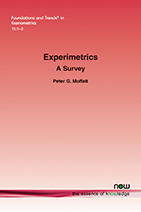Experimetrics: A Survey
By Peter G. Moffatt, University of East Anglia, UK, P.Moffatt@uea.ac.uk
Abstract
This monograph aims to survey a range of econometric techniques that are currently being used by experimental economists. It is likely to be of interest both to experimental economists who are keen to expand their skill sets, and also the wider econometrics community who may be interested to learn the sort of econometric techniques that are currently being used by Experimentalists. Techniques covered range from the simple to the fairly advanced. The monograph starts with an overview of treatment testing. A range of treatment tests will be illustrated using the example of a dictator-game giving experiment in which there is a communication treatment. Standard parametric and non-parametric treatment tests, tests comparing entire distributions, and bootstrap tests will all be covered. It will then be demonstrated that treatment tests can be performed in a regression framework, and the important concept of clustering will be explained. The multilevel modelling framework will also be covered, as a means of dealing with more than one level of clustering. Power analysis will be covered from both theoretical and practical perspectives, as a means of determining the sample size required to attain a given power, and also as a means of computing ex-post power for a reported test. We then progress to a discussion of different data types arising in Experimental Economics (binary, ordinal, interval, etc.), and how to deal with them. We then consider the estimation of fully structural models, with particular attention paid to the estimation of social preference parameters from dictator game data, and risky choice models with between-subject heterogeneity in risk aversion. The method maximum simulated likelihood (MSL) is promoted as the most suitable method for estimating models with continuous heterogeneity. We then consider finite mixture models as a way of capturing discrete heterogeneity; that is, when the population of subjects divides into a small number of distinct types. The application used as an example will be the level-k model, in which subject types are defined by their levels of reasoning. We then consider other models of behaviour in games, including the Quantal Response Equilibrium (QRE) Model. The final area covered is models of learning in games.
Experimetrics: A Survey
“Experimetrics” comprises the body of econometric techniques that are customized to experimental applications. This monograph is aimed principally at two types of reader -- the experimental economist who is interested in expanding their skill set in econometric techniques and the econometrician interested in the econometric techniques currently being used by experimentalists. Of particular interest to the latter reader may be the techniques that have not traditionally been part of the standard econometrics toolkit like power analysis and optimal experimental design. Experimetrics: A Survey allows for the cross-fertilization of ideas from applied and theoretical econometrics resulting in new and improved techniques in Experimetrics.
The purpose of this monograph is to survey these techniques. However, it aims to be more than just a survey of the literature because it also aims to explain the techniques and evaluate them with illustrations, sometimes using data sets from previously published studies. Section 2 provides an overview of treatment testing. Section 3 covers power analysis. Section 4 covers the different types of data arising in Experimental Economics, and the reasons why they arise in the form they do. The remainder of the monograph is concerned mainly with the estimation of fully structural models. Section 5 considers methods for the structural estimation of social preference parameters. Section 6 considers ways of dealing with continuous heterogeneity. Section 7 considers finite mixture models as a way of capturing discrete heterogeneity. Section 8 considers other models of behavior in games, including the Quantal Response Equilibrium (QRE) Model. Section 9 considers models of Learning. Conclusions are found in Section 10.
